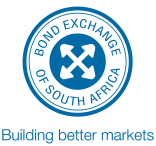Bond Exchange of South Africa
The Bond Exchange of South Africa (BESA) was a South African bond exchange based in Johannesburg that was acquired by JSE Limited in 2009.[1][2][3] Prior to its acquisition it was constituted as a public company, and was responsible for operating and regulating the debt securities and interest rate derivatives markets in South Africa.
 | |
| Public company | |
| Industry | Financial Services |
| Fate | Purchased by Johannesburg Stock Exchange |
| Successor | JSE Limited |
| Defunct | 2009 |
| Headquarters | , |
| Products | Bond Exchange |
History
BESA was granted its exchange license in 1996 and over the next twelve years was responsible for the development of the bond market in South Africa. As an exchange, BESA was in the business of providing a range of platforms and services to address the needs of capital market participants, be it issuers, market makers, traders or investors.
In December 2007, BESA converting from a mutual association to a public company. This was followed by a rights issue which was concluded in October 2008, injecting fresh capital into the business and introducing new strategic partners to the exchange. With demutualisation and capitalisation achieved, BESA focused attention on furthering capital market infrastructure in South Africa through the introduction of projects such as;
- BondClear Limited - a clearing solution developed in partnership with Nasdaq, Inc.[4]
- Justrade.com - South Africa’s first online binary options exchange
By 2008 the South African bond market was a leader among emerging-market economies. Turnover reported on BESA in 2008 reached R19.2 trillion. Given listed debt securities of R825 billion nominal. However the local bond market was still dominated by securities issued by the South African government, with local government, public enterprises and major corporations accounting for the rest of the debt issuers active in the market. The number of borrowers and listed bonds as well as the market capitalisation had all risen sharply, at December 2008 BESA had listed some 1,102 debt securities, issued by 100 sovereign and corporate borrowers, with a total market cap of R935 billion.
In 2009 the Johannesburg Stock Exchange acquired the BESA for R240 million and rebranded as the JSE debt market.[5][1]
Rules and protections

As the direct regulator of the bond market, BESA operated within the framework of the Securities Services Act 2004 of South Africa and a set of rules and directives approved by the Financial Services Board (FSB). BESA's rules and directives served as a tool for regulating both issuers and trading participants. Extensive rules also applied to trading participants, with BESA undertaking active surveillance over all aspects of market activity as well as requiring compliance with a variety of best-practice standards.
See also
- Bond market
- The South African Futures Exchange
References
- "Moves to make bond trading fairer to you". iol.co.za. 2011-10-30. Retrieved 2013-08-20.
- "BESA & JSE welcome approval of merger by competition authorities". Archived from the original on 2013-08-20. Retrieved 2013-08-20.
- "HM Revenue & Customs: Designation of the Bond Exchange of South Africa as a recognised stock exchange for tax purposes". Hmrc.gov.uk. Archived from the original on 2008-10-10. Retrieved 2008-10-14.
- "NASDAQ OMX and Bond Exchange of South Africa Limited Establish BondClear". Nasdaq.com. Retrieved 2008-10-14.
- "JSE Debt Market". JSE Limited. Retrieved July 22, 2014.